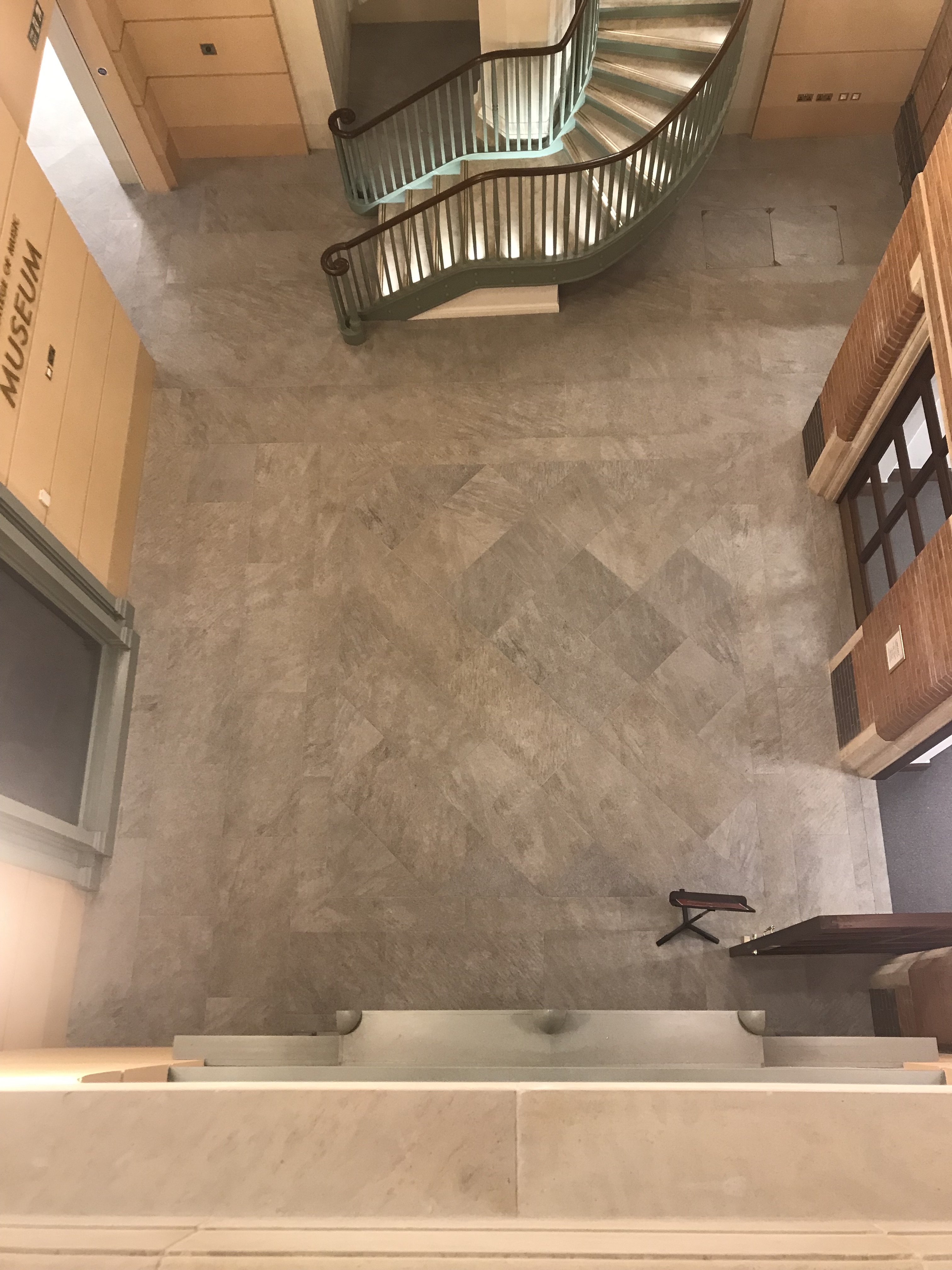our share of night to bear
for soprano, trombone, percussion, 6 pianos
The Royal College of Music’s new atrium has a beautiful, luminous acoustic ... constantly demonstrated by the music that floats in from our upstairs practice rooms.
This site-specific work was composed for the atrium of the Royal College of Music, London. This cavernous space has a resonant, church-like acoustic ... but it’s often filled with the sound of practising from windows that open onto it.
Inspired by the random music floating around the space, my friend and colleague Roelof Temmingh directed Hildegarde in the Atrium, a concert of spiritual music and new compositions, in the atrium in March 2022.
Web score and recording
The premiere of this work used an automatic web score that displayed the score one phrase at a time to the players.
Explore the web score here, together with a recording of the premiere.
“My rendition of “night” is like a musician having an emotional breakdown to the tune of brutalised ‘wrong note quotes’ from the piano repertoire.”
Concept
On the surface, I've composed a tongue-in-cheek depiction of music students furiously practising. It was inspired by the colourful cacophony heard around the RCM building, including in the café itself.
Each performer follows their own instance of a web-based score, which advances their part line-by-line at preprogrammed times. The intention is to sound like a wall of sound, a wave of crazed practising. Performers essentially live inside their own “bubble:” they only need to pay attention to their own score, and are desynchronised from all other performers.
Poem
our share of night to bear is a setting of the poem with the same title by Emily Dickinson.
Our share of night to bear,
Our share of morning,
Our blank in bliss to fill,
Our blank in scorning.
Here a star, and there a star,
Some lose their way.
Here a mist, and there a mist,
Afterwards—day!
Emily Dickinson: Our share of night to bear
This work is more of a dramatisation of the poem, rather than a faithful song-like setting. “Night” is dark, turbulent, and horrifying, a musical overload and disintegration with a heavy dose of “scorning.” What better way to show scorn than with some ironic quotations from piano classics? This “night music” possesses the opening soundworld and later intrudes twice, but soon evaporates into the calm of “day.”
Words into sound
This lurid wall of musical noise is also about an internal journey from the darkness of night into the light of day, as voiced by Dickinson’s poem above. A person is coming from distressing turmoil into the light of day, accepting everyone has a “share of night” that will eventually pass.
Instead of setting the poem lyrically, I've sought to dramatise its extreme possibilities—a confrontation and struggle between “night” and “day.” My rendition of “night” is like a musician having an emotional breakdown to the tune of brutalised “wrong note quotes” from the piano repertoire. The pianos include distorted quotations from Tchaikovsky, Bach, Liszt, Scriabin, Prokofiev and Rachmaninoff. After subsequent invasions, chaos eventually evaporates away into the calm of “day.”
Context (written in 2022)
My music is normally apolitical—at least, at present. I wish to communicate to audiences no matter their political views and believe that music can speak across boundaries.
However, as I was trying to write the arrival of “day,” Russia cruelly—barbarically—demonically—invaded Ukraine. our share of night to bear closes with a hidden allusion to the Ukrainian national anthem, in the form of polytonal fragments passed between four pianos. It is merely a weak tribute from someone who is not Ukrainian, someone who remembers that music “can’t stop the wars, can’t make the old young again or lower the price of bread.” ✶)
I think of how arts and plesantries seem insignificant in the face of wars, disasters, and suffering ... and at the same time, how they are a deep, irreplaceable part of human nature.
[A reflection from 2024: I'm doubtful of the wiseness of writing the material above. It seems to be turning someone else’s suffering into “art,” something I’m questioning whether is a good idea.]
✶) Luciano Berio: Sinfonia, movement 3. Nor can music bring people back from the dead.
Demo track
Beware: the beginning is loud!
Full score
Premiere Performers
Eyra Norman, soprano and vocal artist
James Parkinson, trombone
Toril Azzalini-Machecler, percussion
Cristiana Achim, piano 1
Roelof Temmingh, piano 2 and project director
Arthur Di Francesco, piano 3
Ilayda Oguz, piano 4
Osman Tack, piano 5
Aidan Chan, piano 6
George Campbell, web consultant
Organised by the RCM Chamber Music department. Extra performance iPads loaned by the RCM Digital Learning team.
Backdrop image: RCM atrium
